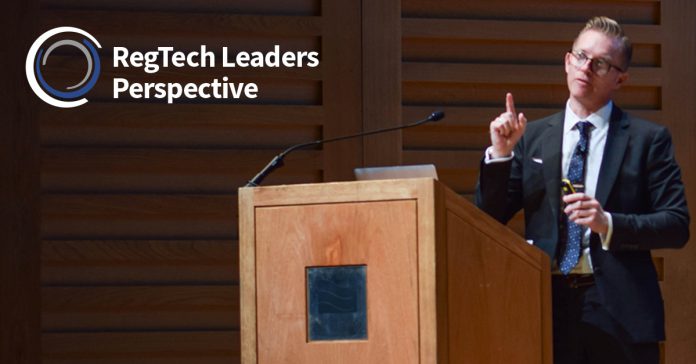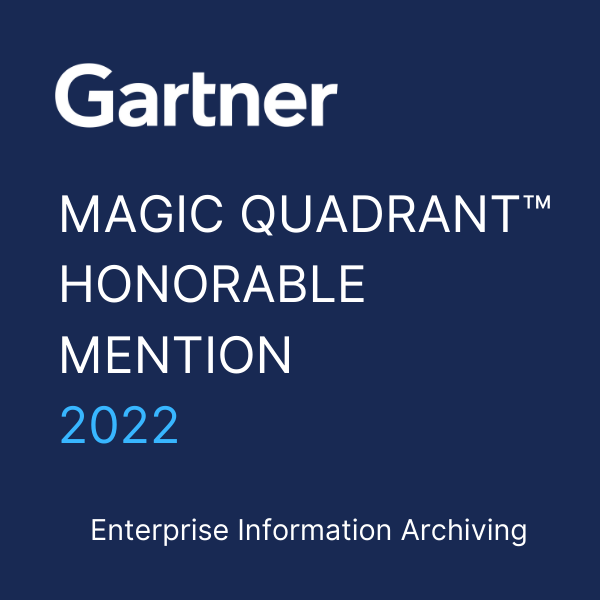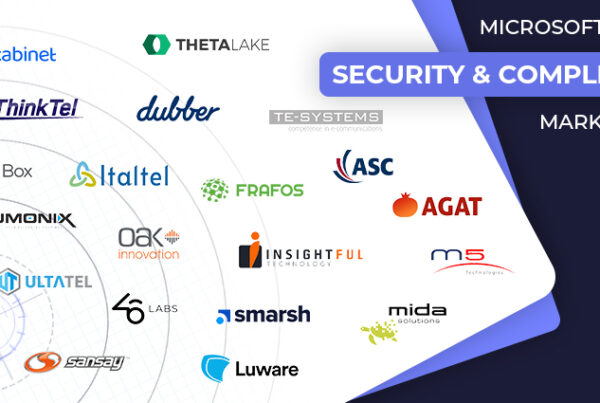
Balancing communication compliance solutions for both legacy systems and new environments is one of the biggest challenges facing financial institutions, according to Theta Lake founder and CEO Devin Redmond.
Last year witnessed several new regulations being deployed across Europe, leaving financial institutions with huge changes to implement to their operations. The monitoring of communications and storing data featured heavily in the developments of new regulations last year, with MiFID II and GDPR being the main offenders.
At the beginning of last year, MiFID II was put into effect and required wealth managers to expand the scope of what they record and store of communications around products or potential transactions, whether it’s via a video call or phone call. This means firms have more data collected from their clients, and GDPR, which was released a few months later, required further compliance measures. When General Data Protection Regulation was released in May, companies were required to be aware of all of a customer’s data they hold and ensure it is protected, and if requested, deleted.
These regulations have given more protections to consumers but have left compliance teams needing to do more to collect, store and protect this information. Redmond believes that a lot of these companies didn’t even realise how much information they had collected, and difficulties come in locating it all, especially information locked in audio or video formats.
Video is becoming an increasingly popular method for companies to communicate with customers but also internally. Implementing personalised sales videos in emails is believed to increase open rates, by as much as 10-times, Redmond said. This is down to the fact they can be a more engaging communication method and can help to provide more clarity with a personal touch. What a lot of firms may not be realising is that communicating in this method is leaving even more data and activity that needs to be supervised.
Theta Lake founder and CEO Devin Redmond said, “Vendors investing in video to capitalise on the obvious benefits, are met with new compliance requirements. If you try to use your legacy technology which is not designed to handle video, it will not work. It cannot figure out if somebody held their personal data up to the camera, misses if the firm’s employee did something risky, or had something displayed behind them in the background.”
It’s these gaps of legacy solutions designed for legacy communication which will cause more and issues for compliance with regulations like MiFID II and GDPR and implementing RegTech solutions like Theta Lake can help firms and financial institutions ensure all types of communications are being monitored correctly.
California-based Theta Lake leverages AI technology to help companies improve the communication compliance through automated risk detection and workflow. The platform helps to monitor communications made through video, voice and unified collaboration systems. When conducting a video review process, it captures everything, such as the people, audio, and images. This information is then put through its AI and deep learning classifiers to identify any risky behaviour, potential regulatory violations, and even making sure disclaimers are spoken or displayed.
As companies do begin to utilise video more frequently and adapt their infrastructure around this new medium, they’re going to have to equally explore new tools to conduct monitoring and surveillance. Redmond said, “It simply won’t be sufficient for firms have upwards of a 3rd of their communications and increasing going over video and unified collaboration with that being unmonitored. It is common sense that this is a quickly growing blind spot, and no firm should wait for a regulator to point that out to them. That would be far too late and not very defensible.”
What some businesses do to claim some bare minimum is have a transcript of the video logged, but this is not adequate for any real monitoring or risk detection. Transcription has value as one baseline service to extract one necessary piece of data from a call, but it doesn’t have the context, and can’t solve the last mile compliance challenge for firms of helping them find risk and efficiently handle reporting and workflow for those risks. A transcript is also not going to help a firm with visual content or track what is displayed on the video, leaving many businesses having to review the entire videos manually. Instead, Theta Lake takes data like transcription and applies its own TranscriptionRN a proprietary natural language filter that adds context, normalization, and relevance to raw transcript. Then that content is added to other data extracted like scenes, faces, images, and more that are extracted, normalized and then run through Theta Lake’s detection policies to find risks for the firm. In order to help companies to accelerate reviewing processes even further, its platform puts indicators on the video when anything was detected and provide hints on how to handle those detections. Enabling firms reviewers to skip to the necessary parts they must review and move onto the next video.
This type of capability is even more important as the regulatory environment continues to shift towards more accountability. Previously, technology simply capturing and storing information was enough to meet basic compliance, but now firms are expected to more proactively review, remediate, report and protect data, Redmond said. In regard to communications, not only do firms have to implement more rigorous compliance solutions for their existing communication methods, such as email or call centres. They now also have to cope with emerging use of video, voice, social media, images, text-based chat conversations.
Devin Redmond said, “This is the biggest hurdle for most FIs who have legacy technologies and environments as they still need to maintain and leverage those technologies while adopting and adapting to new ones. Eventually, they should be able to leverage new compliance technology to cover both their new and old communication environments, but that shift takes time and effort. Many are reluctant to invest due to that pain and cost. In response to that ‘hold out’ and bare minimum mentality, fines continue to be levied at a record pace. When reports point to hard data that the cost of non-compliance is often nearly 3x the cost of staying compliant. Couple that with the additional opportunity cost of not adapting to where and how clients and customers want to communicate, and FIs are in a tough spot. The right answer is to actually commit to new communication technologies and the RegTech to properly monitor them. Otherwise, firms risk their customers and / or missing large chunks of compliance coverage for GDPR or MiFID II.”
Investors have understood the challenges posed by communication monitoring and have been investing a lot of capital into startups developing solutions. Last year, Symphony Communications, which enables users to communicate with internal and external teams and securely share documents and content, bagged $67m in funding – the previous year saw the company raise $63m at a valuation of over $1bn. Theta Lake, which has been in operation for just over a year, is also receiving funds with it closing a $5m round this month from Neotribe Ventures and Firebolt Ventures.








 This article first appeared on RechTech Analyst
This article first appeared on RechTech Analyst

